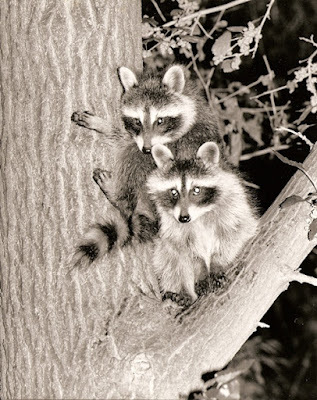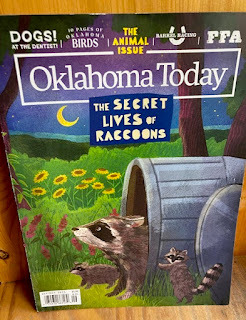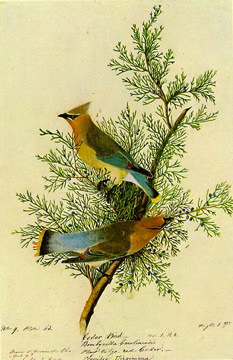Gordon Grice's Blog
September 7, 2025
My Latest Animal Encounters: Raccoons and Black Bears
 Raccoons by Wayne T. Allison
Raccoons by Wayne T. AllisonThe raccoon has sensitive knuckles and a blood-curdlingbattle cry, as you’ll find out in the cover story I wrote for the latest Oklahoma Today (September-October 2025). Artist Madelynn Goodnight and I will show you a sideof this familiar carnivore you probably haven’t seen before.

And, since this is the Animal Issue, you’ll find all sortsof other bestial doings inside, including my tale of backyard encounters with ablack bear.
 Photo courtesy of the National Park Service
Photo courtesy of the National Park Service
August 24, 2025
My Latest Horror Story: Doctor Fouquet Creeps from the Shadows

Behind the Shadows III: Dark Secrets has crept out of theshadows and into paperback. Or, whatever e-format you like, but I always prefer tohold the thing in my own tentacles. As promised, this anthology contains mydarkest story yet, the hideous tale of Doctor Fouquet. He's back from the grave, but that hasn't helped his drinking problem at all!
June 20, 2025
Doctor Fouquet Emerges from the Shadows
The publisher is doing a Kickstarter for this horrifying collection. Pitch in now for percs--and a chance to read my darkest creation, "Doctor Fouquet."

May 7, 2025
The Man-Eating Lions of Njombe
 Illustration by RembrandtSomeone was missing.
Illustration by RembrandtSomeone was missing.The group of women had stood in thedirt road chatting. The bushes stirred nearby, and then everyone was knockeddown. It took them a moment to recover their feet and their senses. That’s whenthey saw that one of them was gone. It didn’t take long to find theexplanation. A lion was strolling away, already several yards distant, and inits mouth, held in a stranglehold, was the woman who had vanished from theircircle without a sound.
In Njombe District, Tanganyika, in theearly 1940s, people lived in fear. The lions had suddenly taken to eating them,and there was little the people could do. Few of them owned effective weapons.Their houses were mostly made of thatch—that is, grass. It was easy for thelions to break in at night, or even to punch a paw through a wall and drag asleeping person out. Everyone was too poor to afford the tools that could havesaved their lives.
One man who did own a decent weaponwas the husband of the woman who’d just been snatched. He grabbed his musketand ran after the lion into the bush. He shouted for his neighbors to followhim, but they were too afraid. In the bush the man heard the sounds of lionsfeeding—moist sounds, varied occasionally by the crack of bone. Soon he saw,partly shielded by brush, the shape of a lioness. She stepped into the open.The fur of her chest and face was matted with blood. What she carried in hermouth made the man shiver with fear—in fact, he shook so badly that thepercussion cap fell off his musket. It was useless. The lioness watched him fora moment, then turned around and carried her burden back into the bush.
What he had seen in the lioness’smouth was a severed leg. His wife’s.
The Njombe pride of the 1930s and1940s is estimated to have killed more than 1500 people. A game warden namedGeorge Rushby, who hunted the lions, noticed that the lions no longer ate biggame like buffalo and zebra; they seemed to eat only bush pigs and humans. Whenthey ate humans, they often devoured everything except the skull, which theywould crack open like a nut to eat its nutritious contents. Several times,Rushby found a human skull like a bowl licked clean. The killing only stoppedwhen the pride was exterminated.
April 14, 2025
A Nightmare: Poem by Christina Rossetti
A Nightmare(Often printed in a bowdlerized form as "A Coast-Nightmare." The text here is Rossetti's uncensored version.)I have a love in ghostland— Early found, ah me, how early lost!—Blood-red seaweeds drip along that coastland By the strong sea wrenched and tossed.In every creek there slopes a dead man’s islet, And such an one in every bay;All unripened in the unended twilight: For there comes neither night nor day.Unripe harvest there hath none to reap it From the watery misty place;Unripe vineyard there hath none to keep it In unprofitable space.Living flocks and herds are nowhere found there; Only ghosts in flocks and shoals:Indistinguished hazy ghosts surround there Meteors whirling on their poles;Indistinguished hazy ghosts abound there; Troops, yea swarms, of dead men’s souls.—Have they towns to live in?— They have towers and towns from sea to sea;Of each town the gates are seven; Of one of these each ghost is free.Civilians, soldiers, seamen, Of one town each ghost is free:They are ghastly men those ghostly freemen: Such a sight may you not see.—How know you that your lover Of death’s tideless waters stoops to drink?—Me by night doth mouldy darkness cover, It makes me quake to think:All night long I feel his presence hover Thro’ the darkness black as ink.Without a voice he tells me The wordless secrets of death’s deep:If I sleep, he like a trump compels me To stalk forth in my sleep:If I wake, he rides me like a nightmare; I feel my hair stand up, my body creep:Without light I see a blasting sight there, See a secret I must keep.
March 2, 2025
NEW STORY: A Series of Elegant Heads

Proud to be included on Doric Literary, a site dedicated to short stories in the classic style. My piece is about an artist who likes to mess with your head. And not just yours--he'd actually like to create A Series of Elegant Heads.
February 9, 2025
Fruit-Drunk and Flying

In the January-February 2025 issue of Oklahoma Today, we’reall about the food. My colleagues wrote about foods humans can eat, but ofcourse I was interested in animal food—particularly the diet of the fruit-drunklittle bird called the cedar waxwing.
February 5, 2025
Man-Eaters of Kamchatka: A True Tale
 Kamchatka Brown Bear
Kamchatka Brown BearKandukuru Nagarjun/Creative Commons
In 2011, Igor Tsyganenkov and his19-year-old stepdaughter Olga Moskalyova stopped at a wild spot along theParatunka River to retrieve a fishing rod they’d left behind. They’d beencamping near the village of Termalniy on Russia’s Kamchatka Peninsula. Thecountry there is famously beautiful—streams winding through birch forest, thesteam of geysers snaking from rugged hillsides, the whole view ringed withsnow-patched volcanoes. Much of the country is given over to national parks.Fishermen there had run into trouble in the past: the brown bears of the arealiked to snatch the fish they caught. Most years there were plenty of fish forboth species, but animals tend to choose the easiest method. It’s easier totake the catch humans have left hanging than to wade into the water and catchthe elusive fish. Usually this habit caused nothing more than scares and a lostcatch. The danger came from the close association bears were forming betweenpeople and easy food. Already, a few bears and a few people had been killed.
Igor was about to become another suchvictim. Among the reeds of the riverside, a brown bear appeared and attackedhim. He seems to have died quickly; his skull was shattered and his neckbroken. Perhaps the bear killed him with a single swat of its paw. Olga’s deathlasted much longer. She saw what happened to Igor and ran away. Running is thewrong thing to do when a carnivore is in a predatory mood: it seems like aninvitation to chase. The bear pursued. Once it had her down and was biting chunksout of her legs, Olga did something unusual. She phoned her mother.
“Mom, a bear’s eating me!” she said.“It hurts so much! Help me, Mom!”
Her mother, Tatiana, thought it wassome macabre joke, but then the tone of Olga’s voice struck her with fear. Sheheard growls—and crunching. Olga begged the bear to stop. The line went dead.
Tatiana frantically phoned Igor. Shegot no answer, of course, because he was lying dead some 200 feet from Olga.But Olga was still alive. She phoned again. The bear had come back, shesaid—with its three cubs. “They’re eating me,” she told her mother. The linewent dead again.
By this time Tatiana had phonedrelatives and police. It was obvious that no one could arrive in time to help,but what else could she do?
Nearly an hour after the first call,Olga phoned again. She was free to do so because the bears had gone to eatIgor’s body. She told her mother the pain was gone. “Forgive me foreverything,” she said. “I love you very much.” And the line went dead.
Igor’s brother and the police reachedthe remote site thirty minutes later. They found the bears feeding on Igor’sbody. Olga lay dead and partially eaten. Authorities brought in a team ofhunters, who tracked down and killed all four bears. It would be unwise toleave even the cubs alive, they said, in case they’d already learned the lessonof how to eat humans.
January 3, 2025
Ambrose Bierce's Mythos
Long before H. P. Lovecraft, Ambrose Bierce wrote his own series of linked horror stories. This video discusses "An Inhabitant of Carcosa" (1886), "Visions of the Night" (1887), "The Death of Halpin Frayser" 1891, and "The Moonlit Road" (1907).
December 5, 2024
Grice Talks Shakespeare at UCLA

Coming soon:
How did Shakespeare write some of the greatest works the world has known? Thanks to recent research, we know a lot about his working methods and techniques. Through lectures and Q & A, this course makes the master’s tools available to you. We’ll look at brief excerpts from the Bard himself and a diverse array of artists who used the same tools, including Howlin’ Wolf and Charles Dickens. This course is suitable for writers of fiction, screenplays, poetry, and more. No special background required.
January 8 - March 12Wednesday 6:00PM - 7:30PM PT via Zoom


